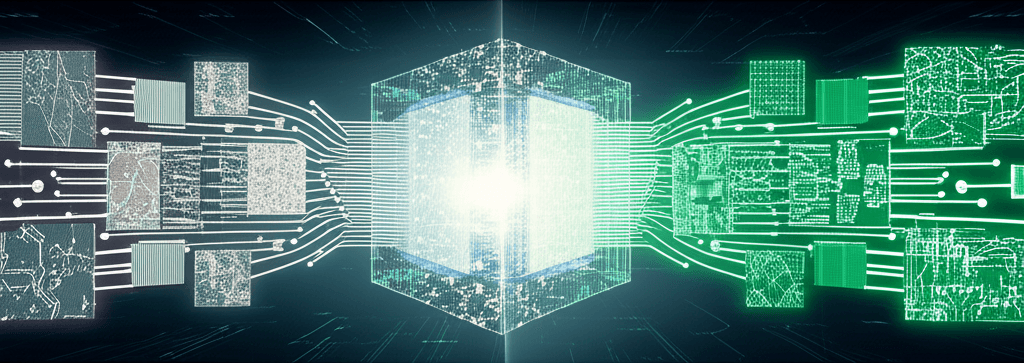Beyond AGI: Harmonic Forges Verified 'Mathematical Superintelligence' to End AI Hallucinations
Harmonic takes on AI's "verification bottleneck" with mathematical superintelligence, promising trustworthy, hallucination-free AI for critical industries.
July 29, 2025

A new front is opening in the artificial intelligence arms race, one focused not on creating ever-more-humanlike chatbots, but on achieving perfect accuracy. AI startup Harmonic has entered the arena alongside giants like OpenAI and Google DeepMind, matching their gold-medal performances at the 2025 International Mathematical Olympiad (IMO).[1][2][3] But Harmonic's ambitions diverge significantly from its competitors. While others pursue the grand goal of artificial general intelligence (AGI), Harmonic is targeting what it calls "mathematical superintelligence" (MSI), a specialized form of AI designed to solve a critical and burgeoning bottleneck in the industry: the verification problem.[1][4] This problem describes the increasingly common scenario where professionals spend more time checking and correcting AI-generated content for factual errors and "hallucinations" than they would have spent creating it from scratch, a paradox that undermines the productivity promise of AI.[4][5]
The explosion of AI-generated content has created an unintended side effect, turning users from creators into human verifiers.[4] In technical fields such as software engineering and data analysis, this means hours are lost confirming the correctness of AI-generated code or validating data processing steps.[4][6] This inefficiency stems from a fundamental flaw in many large language models (LLMs): they are prone to hallucination, confidently presenting inaccurate or fabricated information as fact.[7][8] Studies have indicated that this issue is persistent and, in some cases, worsening even in newer models.[9] The challenge is particularly acute in enterprise settings, where disorganized data and inconsistent content formats can lead AI tools to misinterpret materials and generate flawed outputs that demand extensive human review.[5] This technology-content disconnect creates a significant bottleneck, preventing organizations from effectively scaling their AI-driven operations and leading to a paradoxical increase in workload instead of the promised reduction.[5][10] This verification bottleneck is a major hurdle to the widespread, reliable adoption of AI in critical, high-stakes environments.[4]
Harmonic, co-founded by Robinhood CEO Vlad Tenev and former Helm.ai co-founder Tudor Achim, proposes a solution to this verification crisis with its model, Aristotle.[8][11] The company claims its AI is "hallucination-free" within the domain of quantitative reasoning.[9][7] Unlike competitors whose models were tested informally in natural language at the IMO, Aristotle achieved its gold medal in a formal test where problems were translated into a machine-readable format.[9][11] This distinction is crucial to understanding Harmonic's methodology. Aristotle generates its solutions in Lean, an open-source programming language and proof assistant.[9][4] Before an answer is presented to the user, it undergoes a formal verification process, an algorithmic double-check that is not AI-based, to ensure its correctness down to foundational axioms.[9][4] This method of machine-checkable guarantees is similar to verification technologies used in high-stakes sectors like aviation and medical devices to ensure safety and reliability.[9] When a user poses a complex question, they receive not only the solution in English but also the corresponding Lean code that verifies its accuracy.[4]
The startup's vision extends beyond solving math problems. Harmonic aims to build "mathematical superintelligence" (MSI), defined as AI with mathematical capabilities superior to humans, to accelerate progress in quantitative fields like physics, computer science, industrial design, and software engineering.[8][4][11] The company believes that because mathematics is the language of reasoning, mastering it will enable AI to perform superior structured reasoning, a capability essential for tackling complex problems in science and engineering.[8][4] This approach has attracted significant investor confidence, with Harmonic raising a $100 million Series B funding round in July 2025, valuing the company at $875 million.[9][11] Investors see the potential for a new foundation of verified, scalable reasoning that can be trusted in critical industries like aerospace, chip design, and healthcare, where software reliability is paramount.[4] To expand access, Harmonic has launched a beta version of its Aristotle chatbot for iOS and Android and plans to release an API for enterprise integration and a dedicated web application.[9][7][11]
In conclusion, Harmonic's Aristotle represents a significant philosophical and technical departure from the mainstream trajectory of AI development. By prioritizing verifiable accuracy over the breadth of conversational ability, the company is directly addressing the growing "verification bottleneck" that threatens to stall AI's productivity gains. The successful gold-medal performance at the IMO, achieved through a formal verification process, lends credence to its unique approach.[9][1] While OpenAI and Google focus on building all-encompassing AGI, Harmonic's targeted pursuit of "mathematical superintelligence" offers a compelling alternative: a future where AI tools are not just powerful creators but also trusted, reliable partners in complex, high-stakes domains.[1][4][11] With substantial financial backing and a clear strategy, Harmonic is positioned to pioneer a new class of AI systems where correctness is not a feature, but a foundational guarantee, potentially transforming how we deploy and rely on artificial intelligence in science, engineering, and beyond.[4][12]